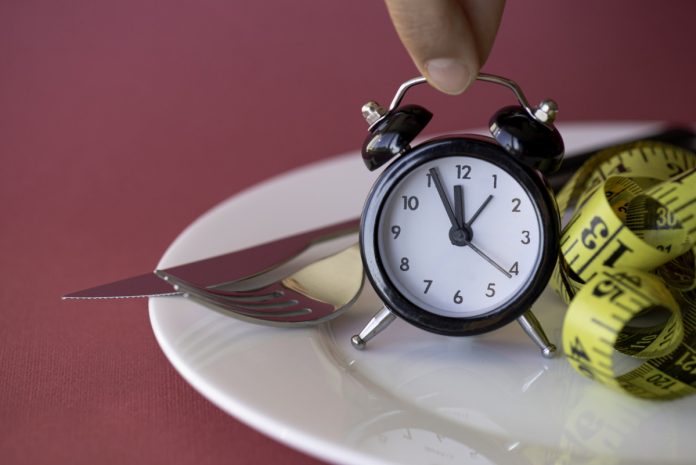The timing of your meals could matter more than you think.
When it comes to losing weight, many of us think about what to eat rather than when to eat. But does the timing of your meals matter? New research suggests that it does, in fact, make a difference.
In the study, researchers examined 90 people with obesity to see whether practicing time-restricted eating early in the day is more effective for weight loss, fat loss and cardiometabolic health compared to eating over a timeframe of 12 or more hours.
Results showed that early time-restricted eating was more effective for weight loss.
Keeping this in mind, should the timing of meals be included in your weight loss strategy? Here’s what health experts have to say.
The Connection Between Weight Loss and Time-Restricted Eating
There are still many unanswered questions with this study.
“Although I agree with the spirit of this experiment, which in my view is to explore whether people are better off not eating all day long from early morning to late at night, there are some problems with this study,” says Dr. Stacie J. Stephenson, a recognized leader in functional medicine and author of Vibrant: A Groundbreaking Program to Get Energized, Reverse Aging, and Glow.
“The study compared eating within an eight-hour window, from seven a.m. to three p.m., on most days of the week, fasting after three p.m. However, they did not compare it to eating within an eight-hour window later in the day, such as from noon to 8 pm. Instead, they compared it to a group that did not practice time-restricted eating, and only fasted for 12 or fewer hours overnight.”
The study talks about why eating earlier in the day may be more effective for weight loss, saying that the body burns more calories earlier in the day, but without comparing this to a time-restricted window later in the day, the study doesn’t actually look at whether this early eating window makes any difference for weight loss. All it really tells us is that people lost more weight when they restricted their eating to an eight-hour period. Would it be just as effective if the eating window was later? This study doesn’t answer that, Dr. Stephenson adds.
Do people tend to eat less when they eat for fewer hours during the day? The study isn’t entirely clear on that point, either. What’s more, other studies, including a 2022 study published in the New England Journal of Medicine, showed that in the case of a lower-calorie diet, time-restricted eating caused no more weight loss or other benefits than the calorie reduction alone without the time restriction.
In addition, this study may also feed into the idea that time-restricted eating, strictly enforced, is necessary for weight loss. This doesn’t work for everyone. In some people, time-restricted eating can lead to overeating and binge-eating episodes, Dr. Stephenson states. This is a case of research on both sides of the issue showing that time-restricted eating, or intermittent fasting as it is sometimes called, is likely beneficial to some people but not to others. It’s also worth considering that this style of eating can be difficult if you are feeding a family, and can interfere with social activities for many people.
Dr. William Li, physician, scientist, president and medical director of the Angiogenesis Foundation, and author of Eat To Beat Disease: The New Science of How Your Body Can Heal Itself explains that the study did not conclude there was an “ideal time window” only that the shorter your eating window, the more weight you would lose. In fact, both 12 hour and 8 hours of eating time during the day were beneficial.
What was interesting is that the shorter time window group began eating early, at 7 a.m., and stopped eating at 3 p.m. in the afternoon. This shorter period of eating means the body essentially begins fasting from mid-afternoon until early the next morning, for a total of 16 hours.
Lab studies of mice examined this same period (16 hours of fasting and eight hours of eating) and showed it could produce weight loss, Dr. Li states. The reason is that during fasting, insulin levels in the blood are lower. Insulin normally prevents lipolysis, the process of burning fat for energy, so when insulin levels are lower, there is more time to burn down fat. This was what led to the “16/8” intermittent fasting trend, and the study by Jamshed, et. al. supports this time window.
Both 16 hours and the 12 hours of fasting produced clinically meaningful weight loss—they both worked—although 16 hours led to almost 50% more weight loss.
The 16-hour group started eating very early in the morning and stopped mid-afternoon. It is not known if the same results would occur if you started late in the morning, say at 11 a.m., and ended in the early evening, like at 7 p.m.
In the study, there were dropouts in the shorter eating window group because they were unable to adhere to the diet. So, practicality factors into this kind of more restrictive eating pattern. If you can’t stick to the plan, it won’t work.
Both groups had nutrition coaching, were asked to have regular exercise, and had decreased their daily calorie intake—these are all factors that can affect weight loss success.
An Effective Overall Strategy for Weight Loss
What actually works best is to follow your body’s own natural hunger cues.
To do this, first, you need to clean up your diet, Dr. Stephenson explains. Processed foods, with their tempting combinations of sugar, fat and salt, can confuse natural appetite cues, making us think we need more food than we actually require. If you switch to a mostly whole-food diet, what usually starts to happen is that you begin to appreciate actual hunger cues, and in many cases, that may mean you eat within an eight-hour (or 10-hour or six-hour) window naturally.
“For example, sometimes I don’t feel like having breakfast, or I don’t feel like having dinner, or I have a big breakfast and don’t need lunch,” says Dr. Stephenson. “If I’m not hungry, I take that as a cue that I don’t need more food, so I skip that meal. I personally don’t think it matters which meal you skip. What matters is whether you really are hungry and need food, and what foods you choose.”
The bottom line is that humans don’t need to be eating all the time, but many people do so for reasons other than hunger, such as boredom, anxiety, food availability, or for pleasure. Sometimes that’s fine, but if it happens consistently, chances are you will take in more energy than you need and that energy will get stored as fat. It’s not as complicated as people sometimes think it is, Dr. Stephenson adds.
It’s possible that a future study might compare time-restricted eating windows during different parts of the day, and that may provide more evidence that eating earlier is slightly more conducive to weight loss than eating later, but it would be necessary to see those results.
Eating, weight gain and weight loss are highly individual and subject to many external and internal factors, Dr. Stephenson explains. Eating intuitively according to your individual needs is a more reliable way to help your body reach and maintain a healthy weight for you



























